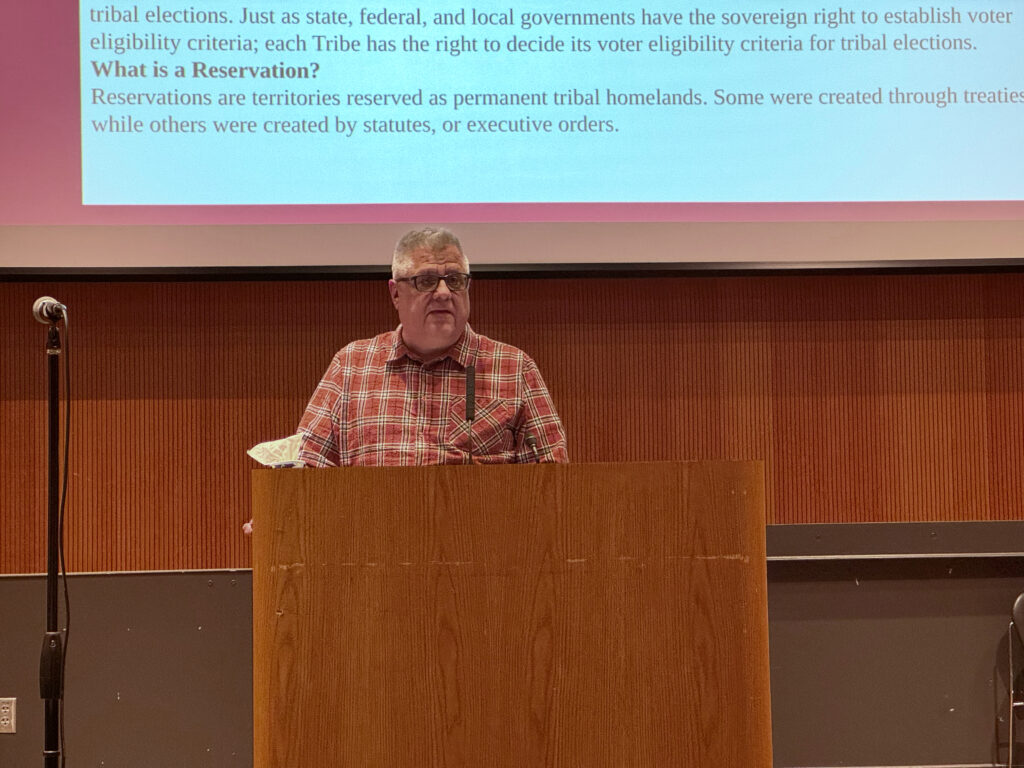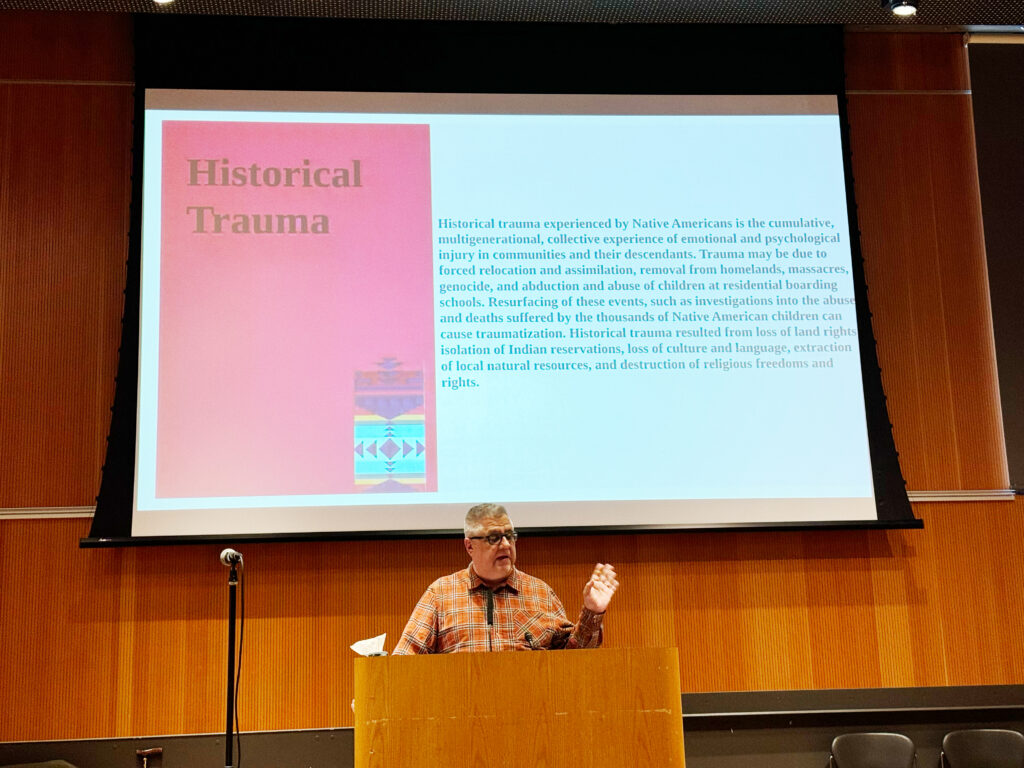Jhon Kuppens shares his story and the history of tribal politics, sovereignty, and rights

Did you know that Native Americans couldn’t be United States citizens until 1924, and that state law continued to prevent some from voting until long after that? Did you know that California committed a genocide against Native Americans — and only apologized in 2019?
Jhon Kuppens delivered the third and final Penguin Talks on October 31 at Vancouver Community Library. He spoke on the theme of Native American, Indigenous or Indian? – about American Indian tribal histories, sovereignty, federal trust responsibility, and rights. Kuppens discussed the impact of tribal politics, culture, law, jurisdiction, and values while examining the legacy of historical trauma.
Kuppens is an enrolled member of the Gabrielino-Tongva Indian Tribe, a California Indian Tribe known as the San Gabriel Band of Mission Indians. He holds a Master of Legal Studies degree in Indigenous Peoples Law from the University of Oklahoma College of Law and a Bachelor of Arts degree in Social Science from Washington State University.
Kuppens shared his own story. Because of his name inherited from his father, he was frequently told “you don’t look Native American,” which he found very hurtful. His mom’s side was an early California family, and he is descended from enslaved Native Americans forced to work at the San Gabriel Mission run by Spanish colonizers. He asked if anyone had read the book Island of the Blue Dolphins growing up. “That’s my tribe.”
While he was immersed in his culture growing up, he was always told to hide his Native American and Spanish heritage from those outside the tribe. “It was [perceived as] a negative thing.”
He explained that while he knew some about his own tribe’s history, there was much he didn’t know about the history of tribes across North America growing up.
When he was a young man, he became curious about his heritage. After an interaction with the Bureau of Indian Affairs gave him a glimpse of the complexities of tribal law, he dived further in to learn more and eventually became a lawyer himself.

Tribal rights
- While many tribes have treaties with the United States that protect their rights, the United States has disobeyed those treaties.
- Getting federally recognized is an incredibly complicated process with two pathways: acts of Congress, or an extremely complex recognition process through the Bureau of Indian Affairs.
- Many tribes have been fighting for federal recognition for decades. Even Sacagawea’s tribe, the Lemhi-Shoshone, is not federally recognized.
- The United States frequently gave unwanted desert land to tribes for reservations. Now, companies attempt to take natural resources from those lands against the will of the people who live there. For example, the Navajo Nation has and is near a lot of valuable uranium deposits. Mining is creating health hazards for the Navajo people and they are trying to take legal measures against the miners.
- Jurisdiction can be very complex on lands belonging to Native Americans. It can be very difficult to determine who has the rights to what under criminal law, family law, and public services.
Local tribes
- Tribes local to our area include the Cowlitz Tribe, the Chinook Nation, the Yakama Nation, and more.
- Local tribes helped Lewis and Clark survive winter as they traveled through what is now known as the Pacific Northwest.
- Cowlitz Tribe only recently gained federal recognition (2000) and a reservation of their own (2015).
- Chinook Nation has been fighting for federal recognition for over 120 years. They were briefly recognized in 2001, but the status was revoked 18 months later.
- In 2022, the Yakama Nation won a court case against Klickitat County which preserved their ownership of treaty-granted lands on Mount Adams and in Southwest Washington.
Speaking about Native Americans with respect
- Native Americans don’t like being considered “minorities,” and most don’t prefer the term “Indian.”
- Alaska Natives should not be called “Eskimos.”
- The terms “Indian-giver”, “totem pole”, “powwow”, and “off-the-reservation” when used as casual idioms are rooted in racism and disrespect of Native American culture.
Kuppens ended his talk with a tip: “When you meet tribal people, have a kind heart towards them.”
Want to learn more?
Sign up for Kuppens’ Community Education class, “Tribal Sovereignty, Federal Recognition, and Federal Trust Responsibility.” On three Tuesday sessions between November 3 and 19, Kuppens will share more about tribal law to better prepare those who collaborate and work with tribal governments.
About Penguin Talks
Clark College and Fort Vancouver Regional Libraries partnered to present Penguin Talks, a lunchtime speaker series at noon on three consecutive Thursdays in October in the Columbia Room at Vancouver Community Library, 901 C Street, Vancouver. The free, public series featured local experts sharing their knowledge about critical topics impacting our community.
Recaps of the first two Penguin Talks:
Dr. Terry Brown presented “The Power of Education” on October 17, 2024.
Melissa Williams presented “Grapping with our Racialized History” on October 24, 2024.
Photos: Clark College/Carly Rae Zent













